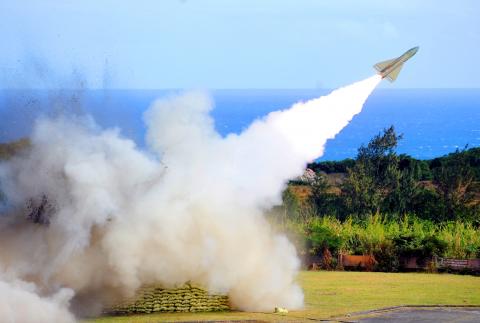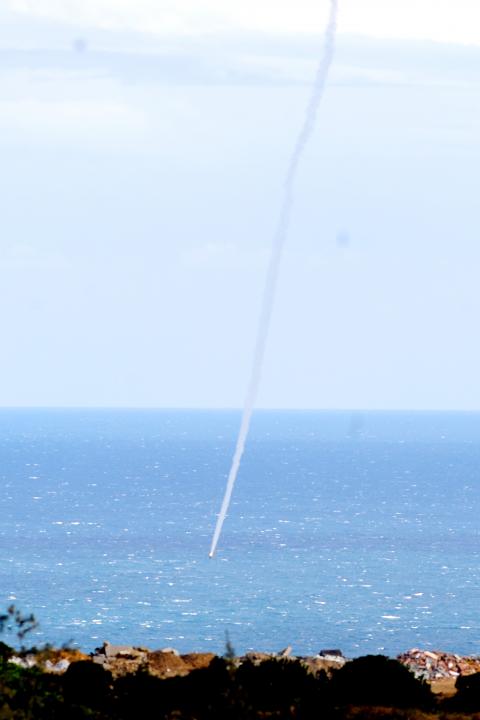President Ma Ying-jeou (馬英九) yesterday said he was “not happy” with the results of a major air defense missile test at a testing base in Pingtung County that coincided with the departure of Chinese President Hu Jintao (胡錦濤) for Washington on a state visit.
In the first major exercise open to the media at the Chungshan Institute of Science and Technology’s (CSIST) Jiupeng missile testing base in Pingtung County since 2002, three services — the air force, army and marine corps — fired 11 types of surface-to-air and air-to-air missiles, including the indigenous-made Tien Kung II “Sky Bow” (TK-II) and US-made AIM-7 “Sparrow.”
A total of 19 missiles were fired during the air defense drill.

Photo: Chang Chia-ming, Taipei Times
Months in the making and involving the participation of 576 members of the armed forces and the CSIST, the exercise showcased a number of platforms, including the F-16A/B, Mirage 2000, F-5E/F, Ching Kuo Indigenous Defense Fighter and AH-1W Cobra attack helicopter, as well as various ground-based launchers.
However, despite the impressive array, six of the 19 missiles encountered technical problems, with one Sparrow climbing about 200m into the air before radically changing direction and plummeting into the South China Sea.
Of the six malfunctions, four involved missiles coming close to their target, but failing to detonate, while the other two missed their target altogether.

Photo: Chang Chia-ming, Taipei Times
The TK-II, which has a range of 200km, performed handsomely, the military said, reportedly destroying its target at a distance of 100km. At its narrowest point, the Taiwan Strait is about 130km wide.
Air force Political Warfare Department director Pan Kung-hsiao (潘恭孝) told reporters at a debriefing that the military and CSIST were investigating the causes of the malfunctions. Early reports pointed to problems with tracking mechanisms and target acquisition.
At a press conference following the exercise, Ma, who had watched from a building overlooking the sprawling testing base located deep in the mountains, appeared unimpressed.
“I’m not satisfied with the results,” he said. “I hope the military will determine the reasons and improve its training.”
The Ministry of National Defense said an overall success rate of about 70 percent in such exercises was acceptable.
With 13 hits and six misses, yesterday’s rate was slightly short of its target, at 68.4 percent.
The exercise, which came on the heels of China’s unveiling of its J-20 stealth fighter, has given rise to speculation that its timing was no accident and constituted a response to Beijing.
Asked by reporters if the exercise was indeed meant as a countermove against Beijing’s military demonstrations or Hu’s trip to the US, Ma said the drill had “nothing whatsoever” to do with China and was intended to increase public awareness on defense issues.
Ministry officials told the Taipei Times that the timing of the exercise — the first of two to be held this year in the context of the celebrations surrounding the 100th anniversary of the Republic of China — had been set prior to the announcement of Hu’s visit to Washington or the Jan. 11 test flight of Beijing’s J-20.
The date of the second exercise has yet to be announced.

CHAOS: Iranians took to the streets playing celebratory music after reports of Khamenei’s death on Saturday, while mourners also gathered in Tehran yesterday Iranian Supreme Leader Ayatollah Ali Khamenei was killed in a major attack on Iran launched by Israel and the US, throwing the future of the Islamic republic into doubt and raising the risk of regional instability. Iranian state television and the state-run IRNA news agency announced the 86-year-old’s death early yesterday. US President Donald Trump said it gave Iranians their “greatest chance” to “take back” their country. The announcements came after a joint US and Israeli aerial bombardment that targeted Iranian military and governmental sites. Trump said the “heavy and pinpoint bombing” would continue through the week or as long

TRUST: The KMT said it respected the US’ timing and considerations, and hoped it would continue to honor its commitments to helping Taiwan bolster its defenses and deterrence US President Donald Trump is delaying a multibillion-dollar arms sale to Taiwan to ensure his visit to Beijing is successful, a New York Times report said. The weapons sales package has stalled in the US Department of State, the report said, citing US officials it did not identify. The White House has told agencies not to push forward ahead of Trump’s meeting with Chinese President Xi Jinping (習近平), it said. The two last month held a phone call to discuss trade and geopolitical flashpoints ahead of the summit. Xi raised the Taiwan issue and urged the US to handle arms sales to

State-run CPC Corp, Taiwan (CPC, 台灣中油) yesterday said that it had confirmed on Saturday night with its liquefied natural gas (LNG) and crude oil suppliers that shipments are proceeding as scheduled and that domestic supplies remain unaffected. The CPC yesterday announced the gasoline and diesel prices will rise by NT$0.2 and NT$0.4 per liter, respectively, starting Monday, citing Middle East tensions and blizzards in the eastern United States. CPC also iterated it has been reducing the proportion of crude oil imports from the Middle East and diversifying its supply sources in the past few years in response to geopolitical risks, expanding

Pro-democracy media tycoon Jimmy Lai’s (黎智英) fraud conviction and prison sentence were yesterday overturned by a Hong Kong court, in a surprise legal decision that comes soon after Lai was jailed for 20 years on a separate national security charge. Judges Jeremy Poon (潘兆初), Anthea Pang (彭寶琴) and Derek Pang (彭偉昌) said in the judgement that they allowed the appeal from Lai, and another defendant in the case, to proceed, as a lower court judge had “erred.” “The Court of Appeal gave them leave to appeal against their conviction, allowed their appeals, quashed the convictions and set aside the sentences,” the judges